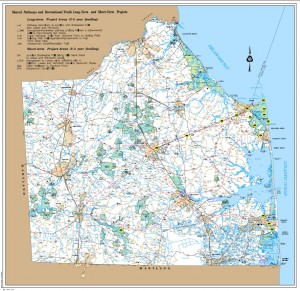 LAUREL – Among a group of outdoors and health organizations gathered for a “Sussex Outdoors” summit today at Trap Pond State Park, Governor Markell previewed his vision for a long term “Statewide Trails and Pathways” project for Delaware. The Governor has charged the Delaware Departments of Natural Resources and Transportation with bringing the vision to life. The proposed program would establish an interconnected network of pathways and trails throughout the state to support non-motorized travel and recreational trails that could be enjoyed by Delawareans and by visitors.
LAUREL – Among a group of outdoors and health organizations gathered for a “Sussex Outdoors” summit today at Trap Pond State Park, Governor Markell previewed his vision for a long term “Statewide Trails and Pathways” project for Delaware. The Governor has charged the Delaware Departments of Natural Resources and Transportation with bringing the vision to life. The proposed program would establish an interconnected network of pathways and trails throughout the state to support non-motorized travel and recreational trails that could be enjoyed by Delawareans and by visitors.
“I want to make it a priority to build a world-class interconnected trail network in Delaware. As an avid cyclist, I know the enjoyment one can receive from being outside,” said Governor Markell. “ These proposed projects will expand or begin trail networks, inside and outside of state parks in all three counties. They will help us realize a truly walkable, bikeable Delaware that all Delawareans can use and enjoy. Our commitment to invest in outdoor opportunities helps ensure the quality of life Delawareans deserve. At the same time, we stimulate job growth through investment in infrastructure.”
The Governor’s goals for the proposed Statewide Trails and Pathways program are to:
- Build a world class interconnected pathway network
- Support creation of local jobs
- Link communities internally to support local sustainable economies, and externally to grow connections between neighborhoods, towns and cities
- Develop sustainable practices in the creation of the network, such as supporting native landscaping and natural habitats
- Support health communities by providing affordable, active transportation choices
- Re-establish Delaware in the Top Ten of Bicycle Friendly states (we’re at #17 right now)
- And, develop strategies for the ongoing maintenance and upgrades of existing facilities.
DelDOT and DNREC have identified seventeen (17) proposed projects for discussion and possible construction over the next 2-3 years, covered by an initial investment of $7 million earmarked for trails in the 2012 Bond Bill. This funding will maximize the state’s ability to leverage federal and private dollars for these projects.
Today, the Governor previewed the plan, by identifying the four Sussex County projects are on the list:
- a proposed a rail-to-trail from Georgetown to Lewes to Cape Henlopen, with the first phase located in Lewes
- a proposed Junction and Breakwater Trail, to complete the missing links to Lewes and Rehoboth at the north and south ends of the trail
- a proposed complete recreational trail at Gordons Pond in Cape Henlopen State Park linking the northern and southern portions of the park
- a proposed partnership with Ocean View, Bethany and South Bethany to construct a recreational trail along the Assawoman Canal
A map of the proposed trails and pathway project areas in Sussex County can be found here.
Tomorrow, at the Delaware Bike Summit to be held at the University of Delaware’s Virden Center in Lewes, DelDOT Secretary Shailen Bhatt and DNREC Secretary Collin O’Mara will sign a Memorandum of Agreement outlining the responsibilities and activities of each agency to build our trails network, with financial stewardship of the program shared by both agencies. They will also unveil the New Castle County and Kent County proposed trails and pathways projects to biking advocates, elected officials and community leaders who are discussing ways to make Delaware more bicycle friendly.
DNREC and DelDOT will also conduct a series of workshops on proposed trails so that property owners, community groups, and other interested citizens have an opportunity for input on the locations and types of trails to be constructed. According to the latest State Comprehensive Outdoor Recreation Plan survey, conducted by DNREC’s Division of Parks and Recreation, 91 percent of Delawareans consider outdoor recreation important to them personally.
 Governor Jack Markell announced at a news conference today that Delaware has banned the dangerous stimulants commonly known “bath salts” now making them illegal in Delaware.
Governor Jack Markell announced at a news conference today that Delaware has banned the dangerous stimulants commonly known “bath salts” now making them illegal in Delaware. “We are taking the unprecedented action of banning these drugs using a little known, but very powerful law, to immediately make them illegal to sell or possess,” said Secretary Bullock. “It’s an action we shouldn’t take lightly, but given the growing danger these drugs pose to our community, it is an action we need to take without delay.”
“We are taking the unprecedented action of banning these drugs using a little known, but very powerful law, to immediately make them illegal to sell or possess,” said Secretary Bullock. “It’s an action we shouldn’t take lightly, but given the growing danger these drugs pose to our community, it is an action we need to take without delay.”